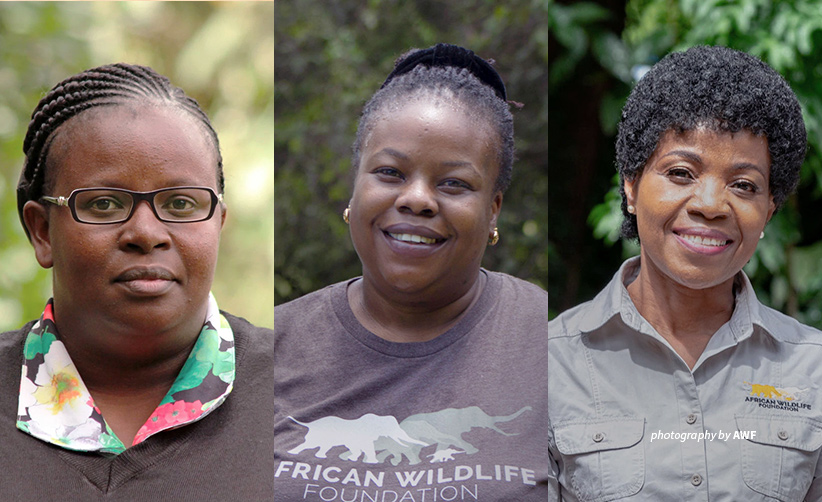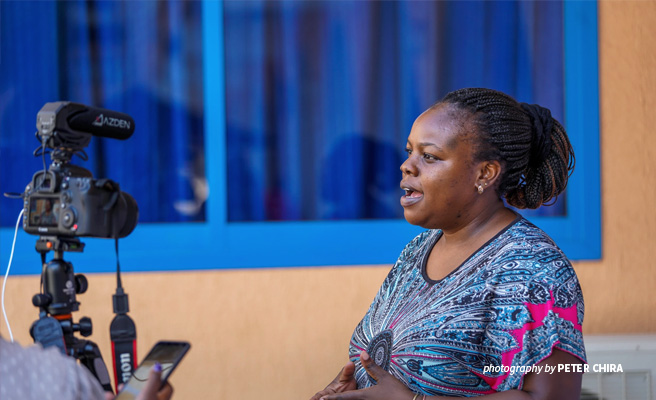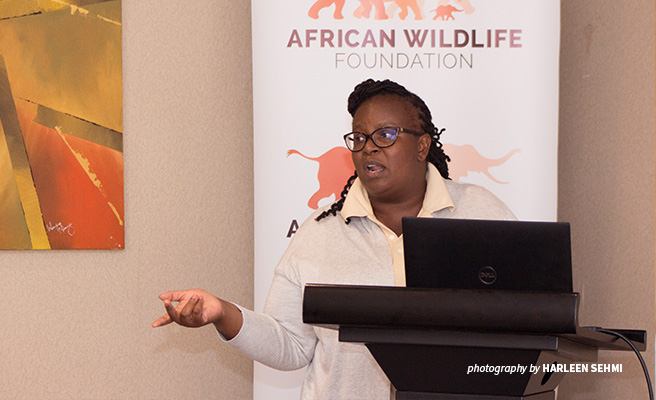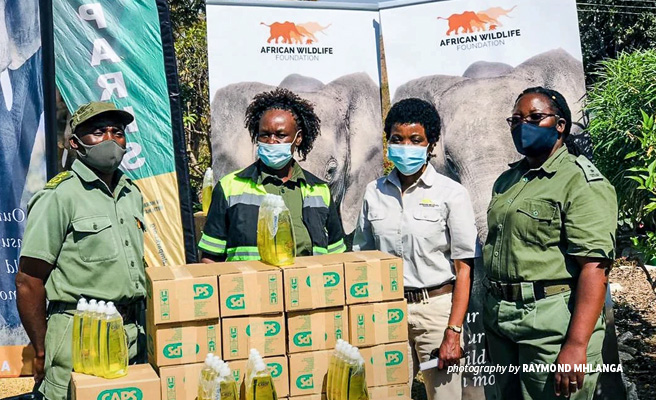Charting a new future for women in conservation

African Wildlife Foundation’s vision for conservation on the continent depends on the equal participation of women and youth in all aspects of biodiversity protection — from conservation science and policy to conservation enterprise and beyond. In honor of International Women’s Day 2021, three women working at AWF look back at their careers and map out the way to a more inclusive conservation space.
Didi Wamukoya, Director, Counter Wildlife Trafficking Program
Before leading African Wildlife Foundation’s counter wildlife trafficking program, Didi Wamukoya was the Head of Prosecution at Kenya Wildlife Service from 2007 to 2015. She is an Advocate of the High Court of Kenya and a trained wildlife crime investigator.
My understanding of the term ‘women in conservation’ is very broad. It includes not only those employed in conservation organizations, but also the women who benefit or profit from biodiversity — for instance, women who make beadwork for sale to tourists or women who utilize natural resources. By this definition, women's participation in the wider conservation sector is probably greater than that of men. Their voice should be heard.
Similarly, we often have a myopic view about wildlife law enforcement. When people think of wildlife law enforcement, they imagine it involves chasing and exchanging fire with a poacher. Yet, there are so many other critical aspects of this work, including the prosecution and investigation of wildlife crimes. Professionals in this sector can also take up roles in mitigating human-wildlife conflict, educating communities about conservation, and even training new wildlife management officers.

The misconception that the work of a wildlife law enforcer or ranger is extremely challenging and dangerous limits the careers of women, who are apparently incapable of enduring the supposed physical demands and harsh terrains. This translates to fewer women rangers deployed to parks in remote areas or fewer women applying for these positions because they would be too far away from their families. However, I have seen my former female colleagues at Kenya Wildlife Service and even women I have interacted with at other agencies take up active roles at parks across the continent. Provided there are good schools and amenities, women can relocate with their families and keep growing their careers as they will now qualify for promotions that require field experience.
When people learn of my background at Kenya Wildlife Service, they often exclaim, “Wow, you were in uniform! That’s so amazing!” Perhaps they mean it as a compliment, but it shows me that they still do not expect women to be in that sphere of law enforcement. We need to see more uniformed women at the front line of conservation so that society can get comfortable with the idea that women can be law enforcers and that they can actually succeed in this field.
In my seven years at Kenya Wildlife Service, I worked in the investigation department and established the agency's prosecution unit to streamline our team’s work. Being a trained lawyer, the new unit allowed me to develop skills within the legal profession while also improving internal systems. Two women on the team trained and mentored me, one of whom was recently appointed Deputy Director of Security, becoming the first woman to head this department.
Although there are qualified women out there, senior leadership in organizations remains skewed towards men. Rather than simply creating a seat at the table for a woman, I believe that organizations should deliberately cultivate women employees' talents to be able to rise into decision-making positions. Apart from supporting and uplifting one another, we need to change the narrative about 'women in conservation’ for those coming after us and let them know that we are fighting for our space in this wide and dynamic sphere. Once you create that space, it becomes known that this is indeed a space for women.
Sylvia Wasige, Senior Project Officer, Species Conservation
Since completing African Wildlife Foundation’s Conservation Leadership and Management Program in 2016, Sylvia Wasige has helped manage various species protection programs within the organization and now leads the successful Canines for Conservation. She has studied up to masters level in wildlife management and is currently pursuing a Master of Business Administration at the African Leadership University.
Traditionally women have taken up key roles in environmental custodianship. In wildlife conservation organizations, women have attained managerial positions. But in the next 10 years, conservation in Africa must change, and the opportunities afforded to women should also evolve to increase their involvement at the decision-making level.
Over the next decade, we need to view conservation from a business lens to contribute to the economies of African countries. To realize this, conservation solutions will have to link other disciplines and sectors. For conservation to have a place at the table, we must speak the language that is understood by all at the table — business. In this realm, conservation practice will not be limited to ecologists and wildlife experts; conservationists will be considered environmental entrepreneurs.

My colleagues at the African Leadership University School of Business represent a cohort of young, talented leaders from diverse fields with the same goal of developing the African dream by tapping into the continent’s resources and fostering ethical leadership. The MBA class of 2020 is a great inspiration as I strive to integrate the lessons with my training and experience in wildlife management and environmental planning. This group has helped me understand Africa in multiple contexts. I am learning that despite the social, political, and cultural differences between countries, the fundamental issues are the same across the continent. We are cross-pollinating ideas with a common goal and creating a solid foundation for multisectoral success based on the V^3 model of Virtue, Value, and Vision.
Conservation leadership must change and embrace this leadership model as conservation practice shifts from the current competitive approaches to a more collaborative strategy. Over the last year, I have been motivated by the women I met at the Pathways Conference in February 2020. We are 30 women engaged in conservation from 14 countries in Africa — our achievements are numerous and hard-won, with some women working under difficult conditions and limited resources. Our insightful discussions at the conference continue to inspire our action as a collective, speaking out on controversial issues in the conservation space and seeking to solve them.
My advice to young women interested in conservation careers is to always make ethical decisions. They should be bold and resilient, and their goal should be to make a positive impact in Africa with their skills and expertise. I learnt how to speak the facts and uphold my integrity from Fiesta Warinwa, who has mentored me throughout my journey within AWF. I admire Didi Wamukoya for her poise and her calm yet firm nature — as well as her sense of humor that makes work enjoyable. Didi and Fiesta have shown me that it is alright to fail sometimes and that one should not be afraid to show vulnerability and courage.
Olivia Mufute, Country Director, Zimbabwe
With over 20 years of experience in ecology, policy development, and implementation of multilateral environmental agreements at Zimbabwe Parks & Wildlife Management Authority, Olivia Mufute joined African Wildlife Foundation in 2017. She led a small team as Project Manager in the Mid-Zambezi Valley and progressed to Country Director within three years.
My career in wildlife and biodiversity conservation has been about personal fulfillment and growth as much as it has been about shaping my country’s relationship to the natural environment. I have been passionate about nature from a very early age and feel very lucky that I have been able to craft my career on this foundation. I have worked with government agencies to draft national policies that recognize nature’s intrinsic and non-intrinsic values, and continue to raise awareness on the interconnectedness of biodiversity in every aspect of human life.
As AWF’s Zimbabwe Country Director, my job is not about ticking boxes. It is different on a day-to-day basis as we contend with the COVID-19 crisis and the existing macroeconomic challenges in Zimbabwe. While these conditions create some delays in implementing projects, I take every hurdle as an opportunity to learn, adapt, and innovate as I push myself towards higher goals.

Women and young people are key actors in any development model to transform a landscape into an economic growth engine using nature as an economic asset. However, it is only in the last few years that African women have taken up leadership roles in conservation, but they are still fewer than their male counterparts. In the early years of my career, I found that I had to work harder than my male colleagues — even if they were my juniors — to be recognized and be considered for promotions. I am thrilled to see more and more young African women involved in conservation work — whether they are studying wildlife species or working with communities as scouts.
In Mbire District, AWF made a conscious effort to ensure that women joined the ranks of community wildlife scouts, despite some resistance of local stakeholders in the Mid-Zambezi landscape. Eventually, five women were recruited, and during their first professional basic ranger training course, one of them was the top performer of the entire group of trainees. They are doing fantastic work as community scouts, and I am so happy to see how their lives have changed since they started working in 2018. Had we not challenged the myth that the work of a community wildlife scout is too “dangerous for women,” they would not have had a chance to make history as the first female members of the district’s anti-poaching unit. I am very proud of AWF’s ground-breaking work in Mbire over the last three years. It may be the only rural district council in the country with a land-use plan, an important document that AWF helped them to develop and that they are proud to own.
Throughout my career, I have strived to inspire the people that I work with and mentor them to transform their areas by inculcating the same values for biodiversity protection among their communities. I see a future where young Zimbabwean men and women play an active role as youth leaders, community wildlife scouts, rangers, politicians, and entrepreneurs who see the potential of their country’s unique natural asset.
> Read more about the first women community wildlife scouts recruited in Mbire District